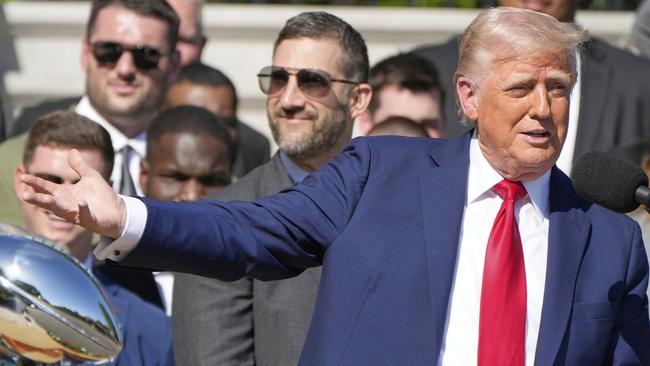Donald Trump’s talk of income tax trade-off on tariffs defies maths
US President Donald Trump keeps suggesting that tariffs can replace income taxes for most Americans. One big problem: The maths doesn’t work.

US President Donald Trump keeps suggesting that tariffs can replace income taxes for most Americans. One big problem: The maths doesn’t work.
Trump has repeatedly teased the notion of linking his tariffs with major income tax cuts, floating a huge change in how the government raises revenue and offering voters worried about tariffs a promise of future benefits. This would expand his agenda beyond extending his expiring 2017 tax cuts and ideas such as “no tax on tips”, which have broad support within the GOP and will be central parts of the “big, beautiful bill” being crafted in congress.
“When tariffs cut in, many people’s income taxes will be substantially reduced, maybe even completely eliminated,” he posted on Truth Social. “Focus will be on people making less than $US200,000 a year.”
Trump’s statements point to a central riddle of his trade agenda – whether the point of higher tariffs is raising money or gaining leverage to strike better deals with trading partners, as some officials and congressional Republicans insist. But even if Trump left high tariffs in place, the revenue wouldn’t come close to the amount raised by income taxes for people making less than $US200,000.
Congress returned to Washington on Monday, and the Republicans in control are trying to get the President’s tax bill written soon, aiming for a house vote as soon as next month. They hope to finish by July 4, Treasury Secretary Scott Bessent said after a meeting on Monday with congressional leaders. The plan will likely extend expiring tax cuts – for all income groups, not just those under $US200,000 – and lower taxes even further for targeted groups such as tipped workers and Social Security recipients. That legislation is also expected to reduce spending on Medicaid and federal food assistance.
Trump and Republicans aren’t actually replacing the income tax with tariffs but, in very broad strokes, they are heading in that direction, lowering one and raising the other. Depending how the bill is written, some people could be pushed off the income tax rolls. Whether any particular household actually comes out ahead, however, depends how much they are hit by the tariffs and changes to government programs.
“We’re living the realistic version of this,” said Brendan Duke, senior director for federal budget policy at the Centre on Budget and Policy Priorities, a progressive group.
Trump’s current suite of tariffs would generate $US167bn this year, assuming his “Liberation Day” levies return in full after the current pause ends, according to the Tax Foundation, a conservative group that favours lower tax rates and fewer tax breaks.
That is a huge jump in tariff revenue, one that is causing worldwide market and economic ripple effects, and it still wouldn’t be nearly enough to eliminate income taxes on people making below $US200,000. In 2022, the bottom 90 per cent of households – those with adjusted gross incomes below about $US179,000 – paid about $US600bn in individual income taxes.
“This idea has been debunked thoroughly by people on the left, by people on the right, by anyone who can do math,” said Erica York, vice-president of tax policy at the Tax Foundation.
Trump also argues tariffs would lead to a surge in domestic investment that would create jobs and revenue. “We’re going to make a lot of money, and we’re going to cut taxes for the people of this country,” he said on Sunday.
That is backwards, York said, because the negative economic costs of tariffs outweigh any benefits. Trump’s emphasis on tariffs as a revenue source runs smack into his use of tariffs to get other countries to the negotiating table.
Tariffs that get imposed and then removed or lowered after a trade deal can’t be a stable revenue source that lets congress eliminate or significantly lower income taxes. “It’s all totally self-contradictory,” Duke said.



To join the conversation, please log in. Don't have an account? Register
Join the conversation, you are commenting as Logout